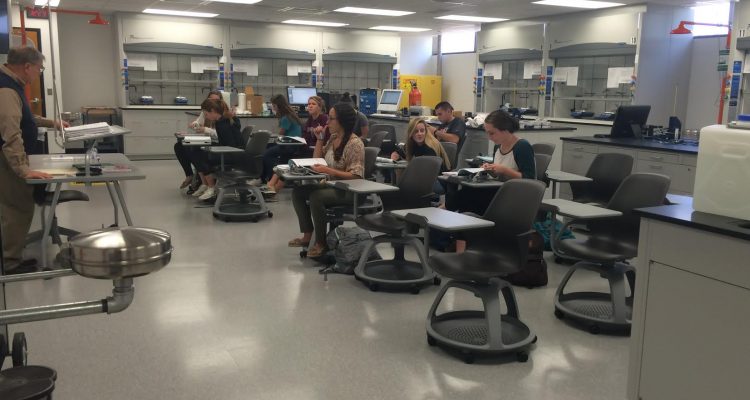To become a chemist, you need practice with experimentation, but gaining knowledge about lab work while you’re an undergraduate student can be incredibly difficult. The new chemistry and biochemistry laboratories are now operational for Fairfield students to gain that lab experience.
Fairfield University’s Bannow Science Center recently became home to many new and improved renovations in its research labs.
The Chemistry Department independently renovated the undergraduate research lab, which was funded by the National Science Foundation grant, with an advanced organic chemistry teaching lab and an addition of an inventive mass spectrometer.
Dr. Kraig Steffen spearheaded the project with assistant professor of chemistry and biochemistry Dr. Aaron Van Dyke.
Van Dyke explained that the plans for the renovation project began over two years ago.
“A subcommittee was formed to assess space utilization with our department. I, along with [associate professors of chemistry] Dr.’s Kraig Steffen, Gary Weddle and John Miecznikowski, served on this subcommittee.”
Van Dyke along with Steffen and their colleagues noticed the substantial student growth and saw that the renovations were necessary.
“We’ve seen continual growth in the number of our majors, but even more significantly as other departments, that is, biology and schools [i.e. nursing, engineering] grow, those students are taking courses within chemistry. Having this additional laboratory space means we will be able to accommodate this student growth,” said Van Dyke.
These innovative labs feature advanced and top-of-the-line laboratory equipment.
Many may notice the ever-increasing progress being made on campus. Projects like the recently completed Leslie C. Quick, Jr. Recreation Complex and School of Nursing, are, in part, because of the Fairfield Rising campaign.
Van Dyke discussed how Fairfield Rising is an opportunity for the University to highlight the distinctive work being done by students, faculty and administrators.
“Professor Smith-Carpenter in our department successfully spearheaded a $271,000 National Science Foundation grant along with myself, Professors Kubasik, Miecznikowski and Andersen.”
The grant will allow for the purchase and launch of what is known as a MALDI-TOF-Matrix Assisted Laser Desorption Ionization – Time of Flight. The device is a mass spectrometer that can measure the molecular weight of compounds.
“The MALDI will fundamentally transform the kind of teaching and research we do here at Fairfield. This will be the only instrument of it’s kind in southeast Connecticut. We expect to establish a Center for Mass Spectrometry at Fairfield so students and faculty from other universities can come to Fairfield to use this research-grade instrument,” explained Van Dyke.
Many faculty members and students are excited about the capability of the high-tech instrument that would be located in Bannow.
“The MALDI-TOF is a research-grade instrument that students can use to assign the identity of unknown chemical compounds. Faculty working with peptides or proteins will find the MALDI especially useful for sequence determination [i.e. figuring out the string of amino acids in peptides or proteins],” explained Van Dyke.
The MALDI’s ability to image 3D tissue and materials will allow for this instrument to be widely used by faculty and staff across campus.
Due to the increase in student interest in this field of study, these labs will allow for students to have the space and resources to work closely with classmates and professors.
Chemistry student Lauren Kearney ‘19 believed that the new equipment and technology will be a great help with her academia.
“With this new and updated equipment, I think we will really be able to partake in labs and experiments that are more geared toward what we are studying,” Kearney said.
“It is really helpful the way the lab tables are set up so that each student can work next to another student to help throughout the class. It is also nice having an inner table of desks so we can have the regular classroom experience while in the laboratory room,” said bio-engineering student Jennifer Egan ‘18.
Following the addition of these cutting edge laboratories, many students will be offered more flexibility when it comes to the labs that they are provided.
“The lab component of a chemistry course is essential to understanding the material in a hands on way,” said chemistry major Alicia Setzer ‘18. “These new renovations to the research lab will benefit us chemistry students by providing us with access to the newest technologies, which will allow us to gain a deeper understanding of the material.”
While these new labs provide experience and opportunity to many students, biology major Natalie Fulco ‘19 would like to see equal opportunity for other science majors.
“I feel that a lot of science majors, with the exception of biology and physics, have received or are in the process of receiving new facilities or equipment, such as nursing, health studies and chemistry. I understand that renovations are expensive, but I would like to see equal opportunity for all majors to succeed and have access to modern technology/resources.”
Nevertheless, the front line work and experience that the students are partaking in now will allow them to be prepared for the challenging industry outside of Fairfield’s campus.
“In terms of the organic chemistry lab, students will now conduct experiments in research-grade chemical fume hoods. These are the same hoods they will see in graduate school or industry. We want their experiences in laboratory to prepare them for life after Fairfield,” said Van Dyke.


Leave a Reply